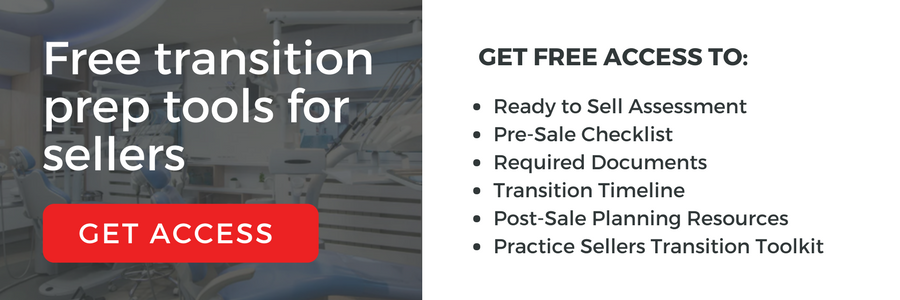For sellers, the thought of selling their dental practice can come with mixed feelings. There can be a feeling of loss of purpose, a concern for the well-being of the patients and staff, but also a sense of freedom of finally being done with the hassles of being an owner. For buyers, the mindset is completely flipped. There’s an excitement in becoming a new practice owner and making money, but there are still worries of financing a practice purchase or finding the information necessary to make a sound decision.
After years of helping both buyers and sellers with dental practice transitions, we have narrowed down three top issues that sellers have with potential buyers.
Failure to disclose information
It may be second nature to withhold information about practice numbers, but when it comes to dental practice transitions, the seller must be transparent and allow the practice to be an open book. In fact, once the buyer has signed a non-disclosure agreement and is actively pursuing the practice, they have free rein to inspect all facets of the practice.
This due diligence process period is a critical part of the transition journey. The buyer is evaluating the seller’s interactions, communications, and data to help build an informed decision about the practice. They are working with their advisors and analyzing data intently. The moment they feel that a seller is not being forthcoming, they may ask questions and in some cases, they will even leave the opportunity altogether. That’s why the seller needs to accommodate the buyer in providing information they want to see such as, financial documents, bank statements, and even the physical practice location itself.
Talking too much
When pursuing a practice acquisition, all the parties are focusing on the closing day. The buyer and seller tend to start talking to each other without their advisor present and although sometimes that's a great thing for the relationship of the parties involved, it can actually hinder the practice transition.
In fact, talking too much can cause issues that you may have never considered. Both the buyer and seller find themselves in a high-stress, high-emotion situation for an extended period of time. When this happens, sometimes the smallest comment or request can cause an issue.
Common Conflicts That Can Arise:
-
Perhaps the selling doctor performed a recent procedure, and the buying doctor remarks, “That isn’t what I would have done.” This innocent comment can easily spiral in this vulnerable situation, putting the seller on the defensive, in turn, the buyer feels defensive, and this breaks down much-needed communication. Alternatively, if either party fails to finish or distribute paperwork or provide information needed to advance the transition, it can cause equal amounts of frustration between the parties.
-
Generally, the seller wants to seem friendly, approachable and help the situation as much as possible. However, in the midst of trying to make a good impression, they tend to make promises they might not be able to keep. They go back to talk to their advisors who unfortunately have to tell them, “Well, you can’t actually promise that” or “No, we can’t do that.”
We’re not saying to shut off all communication. We want you to establish a relationship with the other party, but when it comes to specific requests, those things should come through your advisors. If you allow your advisors to handle these situations, it will allow you to maintain an amicable relationship with the other doctor. Remember, transitioning is generally a one to three month process, there are a lot of questions and demands that can wear down your relationship. Let the professionals you are paying handle the stress, work, and deadlines. All you need to do is what your team asks of you, in a timely fashion. Take a few deep breaths, and enjoy building a good relationship with the transitioning doctor.
Related blog:
How Reviews Can Improve Your Dental Practice Value
Selling Your Dental Practice? Let's Talk Debt Payoff
4 Reasons Why Dentists Need a Retirement Plan
Not establishing a firm timeline
There's a wise saying that “time kills all deals,” and that is very true in practice transitions. Without establishing an upfront timeline of when things will happen, such as a firm closing date, the timeline will start to drag. One big point that we like to push with all of our clients, is to establish a firm timeline to work towards. This tends to motivate all the advisors, buyers, and sellers to achieve the deadline.
Want to understand the practice transition timeline? Download the prep tools to get access to the timeline.
Achieve a Successful Dental Practice Transition
Dental practice transitions can be an emotional rollercoaster with piles of paperwork, discussions, and multiple parties involved. Your advisors are your team, they have your back. Make sure to listen to their advice on disclosing information, communication, and establishing a timeline. Most importantly, follow your gut, work with people you trust, and get excited for this next step in your life! If you need to build your transition team, contact us and we would be happy to help! JPA Transitions focuses on finding the newest and most effective ways to help you realize your practice transition goals, whether it is selling your existing practice, seeking the right practice to purchase, or entering into an associateship or partnership. Contact us today!

 980.283.7355
980.283.7355














Comment